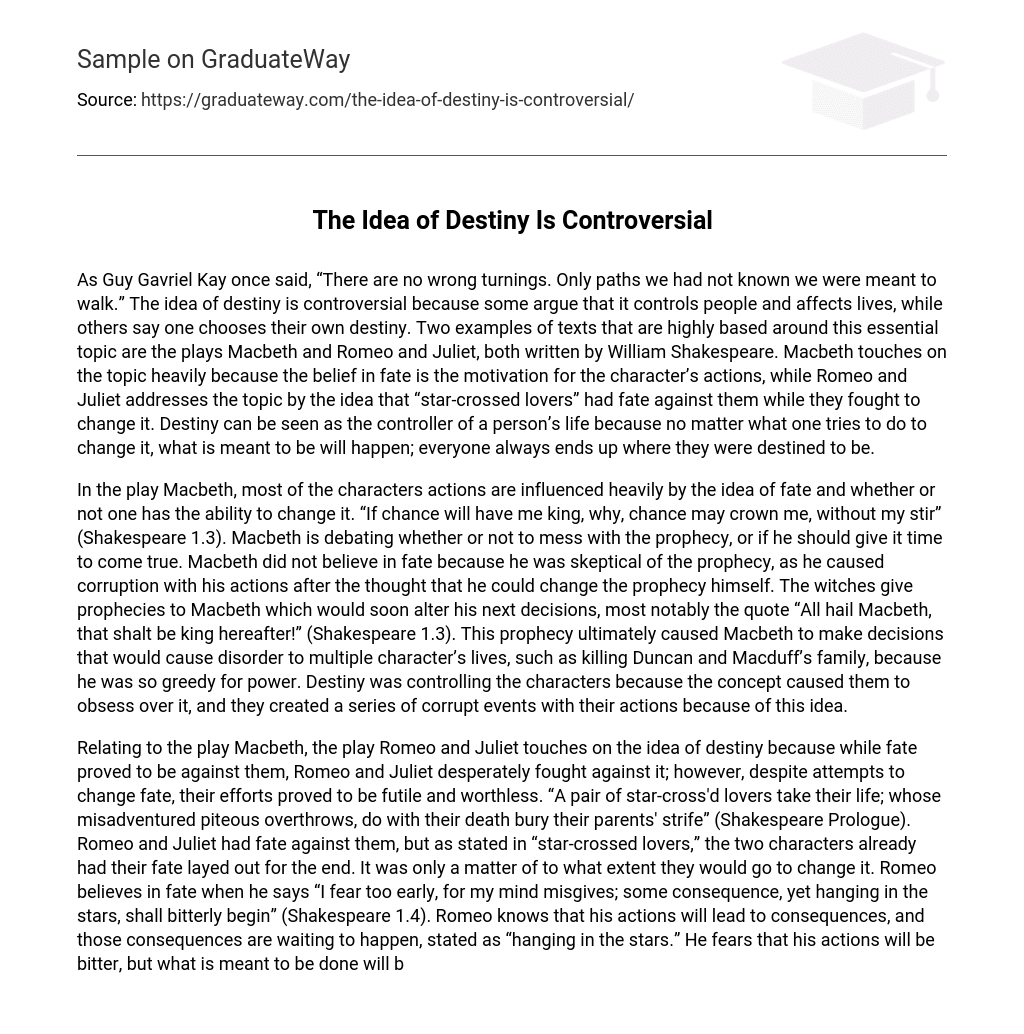As Guy Gavriel Kay once said, “There are no wrong turnings. Only paths we had not known we were meant to walk.” The idea of destiny is controversial because some argue that it controls people and affects lives, while others say one chooses their own destiny. Two examples of texts that are highly based around this essential topic are the plays Macbeth and Romeo and Juliet, both written by William Shakespeare. Macbeth touches on the topic heavily because the belief in fate is the motivation for the character’s actions, while Romeo and Juliet addresses the topic by the idea that “star-crossed lovers” had fate against them while they fought to change it. Destiny can be seen as the controller of a person’s life because no matter what one tries to do to change it, what is meant to be will happen; everyone always ends up where they were destined to be.
In the play Macbeth, most of the characters actions are influenced heavily by the idea of fate and whether or not one has the ability to change it. “If chance will have me king, why, chance may crown me, without my stir” (Shakespeare 1.3). Macbeth is debating whether or not to mess with the prophecy, or if he should give it time to come true. Macbeth did not believe in fate because he was skeptical of the prophecy, as he caused corruption with his actions after the thought that he could change the prophecy himself. The witches give prophecies to Macbeth which would soon alter his next decisions, most notably the quote “All hail Macbeth, that shalt be king hereafter!” (Shakespeare 1.3). This prophecy ultimately caused Macbeth to make decisions that would cause disorder to multiple character’s lives, such as killing Duncan and Macduff’s family, because he was so greedy for power. Destiny was controlling the characters because the concept caused them to obsess over it, and they created a series of corrupt events with their actions because of this idea.
Relating to the play Macbeth, the play Romeo and Juliet touches on the idea of destiny because while fate proved to be against them, Romeo and Juliet desperately fought against it; however, despite attempts to change fate, their efforts proved to be futile and worthless. “A pair of star-cross’d lovers take their life; whose misadventured piteous overthrows, do with their death bury their parents’ strife” (Shakespeare Prologue). Romeo and Juliet had fate against them, but as stated in “star-crossed lovers,” the two characters already had their fate layed out for the end. It was only a matter of to what extent they would go to change it. Romeo believes in fate when he says “I fear too early, for my mind misgives; some consequence, yet hanging in the stars, shall bitterly begin” (Shakespeare 1.4). Romeo knows that his actions will lead to consequences, and those consequences are waiting to happen, stated as “hanging in the stars.” He fears that his actions will be bitter, but what is meant to be done will be done, which is what Romeo can sense in this scene.
The opposition to the claim that “fate controls a person” can be that one can pick and choose fate based on an individual’s actions. This is a weak argument because based on what is displayed in both plays, there is no way of truly knowing how or where one will end up. Fate controls one’s actions. Even in a situation where the end result of fate for one’s life is shown, such as Macbeth, the attempts to change it are not worthwhile. For example, Macbeth ended up murdering all threats to the throne just to end up dead without power. His attempt to kill Fleance failed when he escaped but left Banquo dead. Macbeth was left dead without power. Rather than actions controlling fate, it is truly fate that controls people and actions, because every action leads up to the ending that was meant to be from the start. This is especially shown when Romeo and Juliet both died despite the thought that they were meant to be together.
Fate is an overwhelming concept because it controls every person’s life. Even if one tries to counteract it, if something is truly meant to be, it will happen, and attempts to change it are futile. Macbeth, Romeo, and Juliet are all characters that had no control over fate even when they thought they did. Their stories prove the belief in fate, and when the concept became clear to these characters, they did everything to change it, only for the preordained end to come true. Destiny and fate are not concepts that time should be wasted on trying to change. Fate takes control of an individual’s actions while leading up to the outcome of a person’s life.





